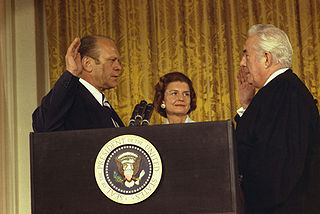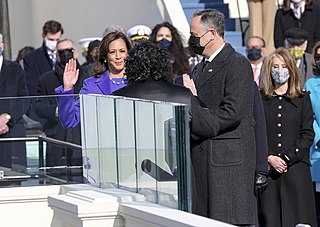
An oath of office is an oath or affirmation a person takes before assuming the duties of an office, usually a position in government or within a religious body, although such oaths are sometimes required of officers of other organizations. Such oaths are often required by the laws of the state, religious body, or other organization before the person may actually exercise the powers of the office or organization. It may be administered at an inauguration, coronation, enthronement, or other ceremony connected with the taking up of office itself, or it may be administered privately. In some cases it may be administered privately and then repeated during a public ceremony.

The president of the Federal Republic of Nigeria is the head of state and head of government of the Federal Republic of Nigeria. The president directs the executive branch of the federal government and is the commander-in-chief of the Nigerian Armed Forces.

The oath of office of the president of the United States is the oath or affirmation that the president of the United States takes upon assuming office. The wording of the oath is specified in Article II, Section One, Clause 8, of the United States Constitution, and a new president must take it before exercising or carrying out any official powers or duties.

The vice president of Nigeria is the second-highest official in the executive branch of the federal government of Nigeria, after the president of Nigeria, and ranks first in the presidential line of succession. Officially styled vice president of the Federal Republic of Nigeria, the vice president is directly elected together with the president to a four-year term of office.

Between 73 and 79 days after the presidential election, the president-elect of the United States is inaugurated as president by taking the presidential oath of office. The inauguration takes place for each new presidential term, even if the president is continuing in office for a second term.

The Fourth Republic is the current republican government of Nigeria. Since 1999, it has governed the country according to the fourth republican constitution. It was in many ways a revival of the Second Republic, which was in place between 1979 and 1983 and suffers many of the same problems, such as multiple ministries which made policy planning difficult. Nigeria adopted the constitution of the Fourth Republic on 29 May 1999.

The inauguration of Gerald Ford as the 38th president of the United States was held on Friday, August 9, 1974, in the East Room of the White House in Washington, D.C., after President Richard Nixon resigned due to the Watergate scandal. The inauguration – the last non-scheduled, extraordinary inauguration to take place in the 20th century – marked the commencement of Gerald Ford's only term as president. Chief Justice Warren E. Burger administered the oath of office. The Bible upon which Ford recited the oath was held by his wife, Betty Ford, open to Proverbs 3:5–6. Ford was the ninth vice president to succeed to the presidency intra-term, and he remains the most recent to do so, as of 2023.

The first inauguration of George Washington as the first president of the United States was held on Thursday, April 30, 1789, on the balcony of Federal Hall in New York City, New York. The inauguration was held nearly two months after the beginning of the first four-year term of George Washington as president. Chancellor of New York Robert Livingston administered the presidential oath of office. With this inauguration, the executive branch of the United States government officially began operations under the new frame of government established by the 1787 Constitution. The inauguration of John Adams as vice president was on April 21, 1789, when he assumed his duties as presiding officer of the United States Senate; this also remains the only scheduled inauguration to take place on a day that was neither January nor March.

The second inauguration of George Washington as president of the United States was held in the Senate Chamber of Congress Hall in Philadelphia, Pennsylvania on Monday, March 4, 1793. The inauguration marked the commencement of the second four-year term of George Washington as president and of John Adams as vice president. The presidential oath of office was administered to George Washington by Associate Justice William Cushing. This was the first inauguration to take place in Philadelphia, and took place exactly four years after the new federal government began operations under the U.S. Constitution.

The second inauguration of Andrew Jackson as president of the United States took place in the House Chamber of the U.S. Capitol on Monday, March 4, 1833. The inauguration marked the commencement of the second four-year term of Andrew Jackson as president and the only four-year term of Martin Van Buren as vice president.

The oath of office of the vice president of the United States is the oath or affirmation that the vice president of the United States takes upon assuming the vice-presidency but before beginning the execution of the office. It is the same oath that members of the United States Congress and members of the president's cabinet take upon entering office.

The first inauguration of Muhammadu Buhari as the 15th president of Nigeria, and 4th president in the fourth Nigerian Republic took place on Friday, 29 May 2015, marking the start of the first four-year term of Muhammadu Buhari as president and Yemi Osinbajo as vice president. It was the 7th presidential inauguration in Nigeria, and 5th in the fourth republic.

Muhammadu Buhari's tenure as the 15th president of Nigeria began with his first inauguration on 29 May 2015, and ended on 29 May 2023. A retired general and member of the All Progressives Congress from Katsina State, he previously served as military head-of-state from 31 December 1983 to 27 August 1985, when he was deposed in a military coup led by General Ibrahim Babangida. Buhari took office following a decisive victory over incumbent Peoples Democratic Party president Goodluck Jonathan in the 2015 presidential election. Four years later, in the 2019 presidential election, he defeated PDP candidate former vice president Atiku Abubakar to win re-election. Upon his inauguration, he became the oldest president in Nigerian history.

The Deputy Governor of Imo State is the political running-mate of the Governor. He serves as the second-in-command to the governor and he's also the second executive officer of the State.On 15 January 2020, Placid Njoku was sworn in as Deputy Governor of Imo State.
The deputy governor of Jigawa State is the second-highest official of the Government of Jigawa State, Nigeria, who acts as the subordinate to the Governor. The deputy governor is selected as a running-mate by the gubernatorial nominee of a party after the primary elections. On 29 May 2023, Aminu Usman was sworn in as deputy governor.
The second inauguration of Goodluck Jonathan as the 14th president of Nigeria, and 3rd in the fourth republic was held on Sunday, 29 May 2011, marking the start of the second and only full term of Goodluck Jonathan as president and Namadi Sambo as vice president. It was the 6th presidential inauguration in Nigeria, and 4th in the fourth republic.
The first inauguration of Goodluck Jonathan as the 14th president of Nigeria, and 3rd in the fourth republic was held on Thursday, 6 May 2010 in the Aso Rock Presidential Villa in Abuja, following the death of President Umaru Musa Yar'Adua the night before. Jonathan had been acting as president since 9 February 2010, 86 days before the inauguration. The inauguration – the first non-scheduled, extraordinary inauguration to ever take place – marked the commencement of the first term of Goodluck Jonathan as president. Chief Justice Aloysius Iyorgyer Katsina-Alu administered the oath of office. Jonathan was the first vice president to succeed to the presidency intra-term, and he remains the only one to do so, as of 2023.
The inauguration of Umaru Musa Yar'Adua as the 13th president of Nigeria, and 2nd in the fourth republic was held on Tuesday, 29 May 2007, marking the commencement of Umaru Musa Yar'Adua's and Goodluck Jonathan's only term as president and vice president. It was the 5th presidential inauguration in Nigeria, the 3rd in the fourth republic and the first successful transition of power, from one democratically elected leader to another in Nigeria. Yar'Adua died 2 years, 341 days into this term, and Jonathan succeeded to the presidency.














